2011: More Trying times for Black America
By Starla Muhammad -Staff Writer- | Last updated: Dec 28, 2011 - 12:56:59 PM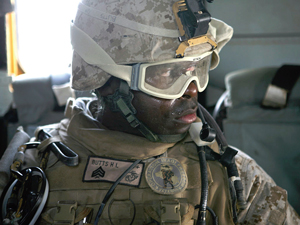 U.S. Marine Corps Sgt. Henry L. Butts in a CH-53E helicopter preparing for landing on Al-Asad Air Base, Iraq. Photo: www.defense.gov/Sgt. M. Trent Lowry |
For events and news stories affecting Black men, women and children, this year bears witness to the insight given by the Honorable Elijah Muhammad that no man or woman can rise above the condition of his or her people.
What lessons did Black America learn this past year and what did 2011 say about the state of Black America? The economy, health, crime, international events and politics took center stage this year yielding mixed results according to a cross section of Black activists, analysts, leaders and commentators.
“Things have not gotten better for Black folks,” Dr. Boyce Watkins, Syracuse University finance professor, author and creator of yourblackworld.com told The Final Call.
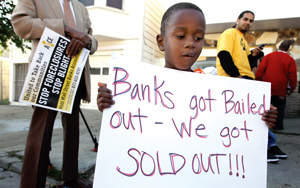 Angel Perry, 2, holds up a sign during a rally to re-occupy a home in San Francisco, Nov. 1. after resident Carolyn Gage was evicted in January, 2011. The Perry’s home was foreclosed on. Photo: AP/Wide World Photos/Paul Sakuma |
“You can’t do a whole lot better than having a Black president and we found that our suffering actually increased under a Black president relative to what it was before,” adds Dr. Watkins.
Despite the grim statistics, Dr. Watkins says 2011 was overall a good year for Black people because “we are always looking forward because we are survivors.”
Dr. Watkins says Blacks have become increasingly more astute politically since the election of President Obama but channeling it into effective organizing has still fallen short.
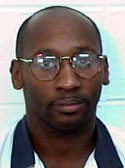 Troy Davis |
“I think that we have a lot of work to do when it comes to organizing effectively but I think in terms of learning how to think for ourselves, I think we made a lot of progress,” he adds.
The Black community faced “everything” in 2011 says veteran, award-winning journalist Bev Smith. “We faced every kind of critical problem a community can face, from illness to crime. But I think it would be the combination of crime and unemployment that are the two issues that have not thoroughly in my opinion been addressed by leadership across this country if there is any leadership,” Ms. Smith told The Final Call.
She was hard pressed to find positive highlights for the year. “You can always look for positive things in our African American community. You can look for young people that are graduating from high school and going to college. You can look for the three out of five young African American men who are not going to jail who are not committing crimes. But the impact of the others who are, is so severe on the community as a whole that there is no portion of our community that isn’t affected by it,” says Ms. Smith.
One of the factors blamed for the disproportionate numbers of Black teens and young adults caught up in crime was unemployment which hit this group particularly hard. In some parts of the county, the unemployment rate for Black teens was anywhere from 40 to 50 percent.
For Black adults the picture was not much brighter with the average unemployment rate hovering at or above 16 percent most of the year well above the national average for Whites.
“Our Black community has been suffering from unemployment from the first four years of the Bush administration. Now the country’s talking about unemployment but our numbers are triple those of the average person in America. So, was there anything good to report? I’m usually optimistic and I usually can say there’s something good coming out of everything but I don’t see it in 2011. I see us more disenfranchised, disorganized, not committed to each other, more selfish than ever before,” says Ms. Smith.
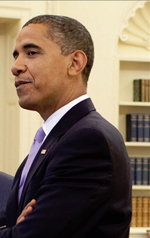 President Barack Obama |
As President Barack H. Obama enters campaign mode for the upcoming 2012 presidential election, the euphoria and optimism felt by the many voters that helped sweep him into office three years ago has turned to skepticism and frustration. For Blacks, 95 percent who voted for Mr. Obama in 2008 this year left little to smile about.
The median wealth of White households is 20 times that of Black households and the average median hourly wage for Black men working full-time is $14.90 per hour compared to $20.84 for White men, according to reports released this year.
Individual families were not the only ones experiencing a rocky year. Even the nation’s oldest civil rights organization was faced with challenges.
Hilary O. Shelton, senior vice president for advocacy for the NAACP, says the good thing about 2011 is that Black people were able to hold on.
“After a slew of victories from 2009 through the end of 2010, 2011 began on a really challenging note…this year was tough,” admits Mr. Shelton, referring to trying to move aspects of the NAACP agenda through Congress and to the president for signature.
The 2010 mid-term elections saw the majority in the U.S. House of Representatives change from Democrat to Republican.
“The toughness was we’ve lost a good friend as the speaker of the House that helped us move our agenda through. And unfortunately the person that replaced her was someone that was strongly opposed to much of the agenda that we were trying to continue to get through as well as many of the victories that we had accomplished in the 111th Congress which ran from 2009 to 2010,” Mr. Shelton told The Final Call.
There was an immediate move in January 2011 in the House to try and rollback the Affordable Care Act that afforded millions of Americans health care coverage, says Mr. Shelton. The move to repeal the act was halted in the Senate so it is still in effect. “It’s still there and now we’re working to get more African Americans registered to be covered by the Affordable Care Act. When we started this fight, 47 million Americans had no health care insurance and over 30 percent of those are African Americans,” notes Mr. Shelton.
The fight keeping health insurance for millions of uninsured was one of many battles the NAACP waged during the year.
International events also impacted Blacks in America, according to Chicago-based activist Pat Hill. The Obama administration’s military intervention in Africa, especially Libya was of great concern to many activists and the killing of Col. Muammar Gadhafi was pivotal, she says.
“His (President Obama’s) wars have been focused on the continent and so I think unwittingly we don’t realize the effect it’s having…the economic situation is really a bi-product of the wars because war is very expensive,” argues the long-time activist and former Chicago police officer.
Ms. Hill says prices for everyday items have increased and much needed services have been cut, impacting the Black community. “The money to pay for the wars has come from somewhere else and you can look at the cost of living just all around, how expensive everything has gotten and it is a direct impact of the wars,” says Ms. Hill.
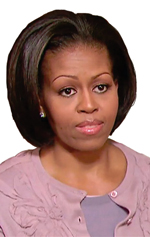 First Lady Michelle Obama |
While some pundits still contend having a Black family as the first family of the United States the past three years points to a “post-racial” society, 2011 ends pointing out even the president and first lady cannot escape the racial animus that continues to permeate the very fabric of the world’s most powerful nation.
Congressman Jim Stensenbrener (R-Wisc.) was recently overheard making inappropriate remarks about First Lady Michelle Obama’s backside, harkening back to the days when White slavemasters commented on the physique of Black slaves as they stood on the auction block prior to being sold off.
In a separate incident, former Tea Party political candidate Jules Manson was visited by the Secret Service after reportedly calling for the assassination of President Obama and his “monkey children” on his Facebook page as reported by the New York Daily News.
Incidents like these show racism is still a virus in society even in 2011 Rev. Marcia L. Dyson told The Final Call. “I think we haven’t come as far in race relationships. Electing a Black man for president is about choosing one Black man but it has nothing to do with how they really may think about African Americans in general,” says the ordained minister and lecturer.
“Obviously if a non-Black said it, they still have a fixation on the Black female body, something that they can no longer have as chattel. So since you can’t lock it down in iron you can try to throw straws at it. But Michelle Obama is a fierce Black woman from the South Side of Chicago and has more grace to even be insulted by the ignorance of a few in America,” says Rev. Dyson when asked about the comments made by Rep. Stensenbrener.
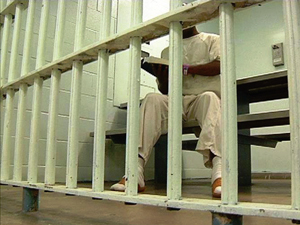 Some analysts say high Black incarceration rates are tied to high unemployment rates. |
“There are people individually working themselves crazy trying to help. One of is course Ben Jealous from the NAACP, the other one is Mark Morial from the Urban League. They’re all working but they’re all working within their own group…they’re working to get things done but unfortunately we do not have the grassroots organization that we had in the ’60s, ’70s, ’80s and into the middle of the ’90s, we just don’t have it,” says Ms. Smith who challenged churches and other religious organizations to become more involved in collectively solving problems.
Ms. Smith added that the critical analysis of issues raised by Minister Louis Farrakhan at the 2011 anniversary of the Million Man March in Philadelphia is needed. “Are the leaders more concerned with their own agenda than they are with the agenda of the African American community? I don’t know. The community has to answer that question. My answer is I think we’ve become very selfish as Black leaders and we don’t have the commitment of the leaders in the past,” says Ms. Smith.
In his address, Min. Farrakhan reminded the audience that the success of the historic Million Man March in 1995 was because of courageous religious and political leaders and various groups that rose above their differences to make it a success. The Minister said the same level of unity and commitment among Black leadership is required today.
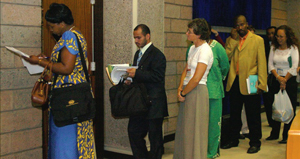 Line forms at an unemployment office. |
Rev. Dyson says as Black Americans head into another year, the upcoming 2012 presidential election is time to once again become actively engaged in the workings of the political process.
“I hope that we become better citizens in 2012 and not so much choose a man or a woman but to choose the issues into which we will fight for to make sure once the elected official is in office that the things that are relevant to us, that we let them know who is the boss,” says Dr. Dyson.

No comments:
Post a Comment